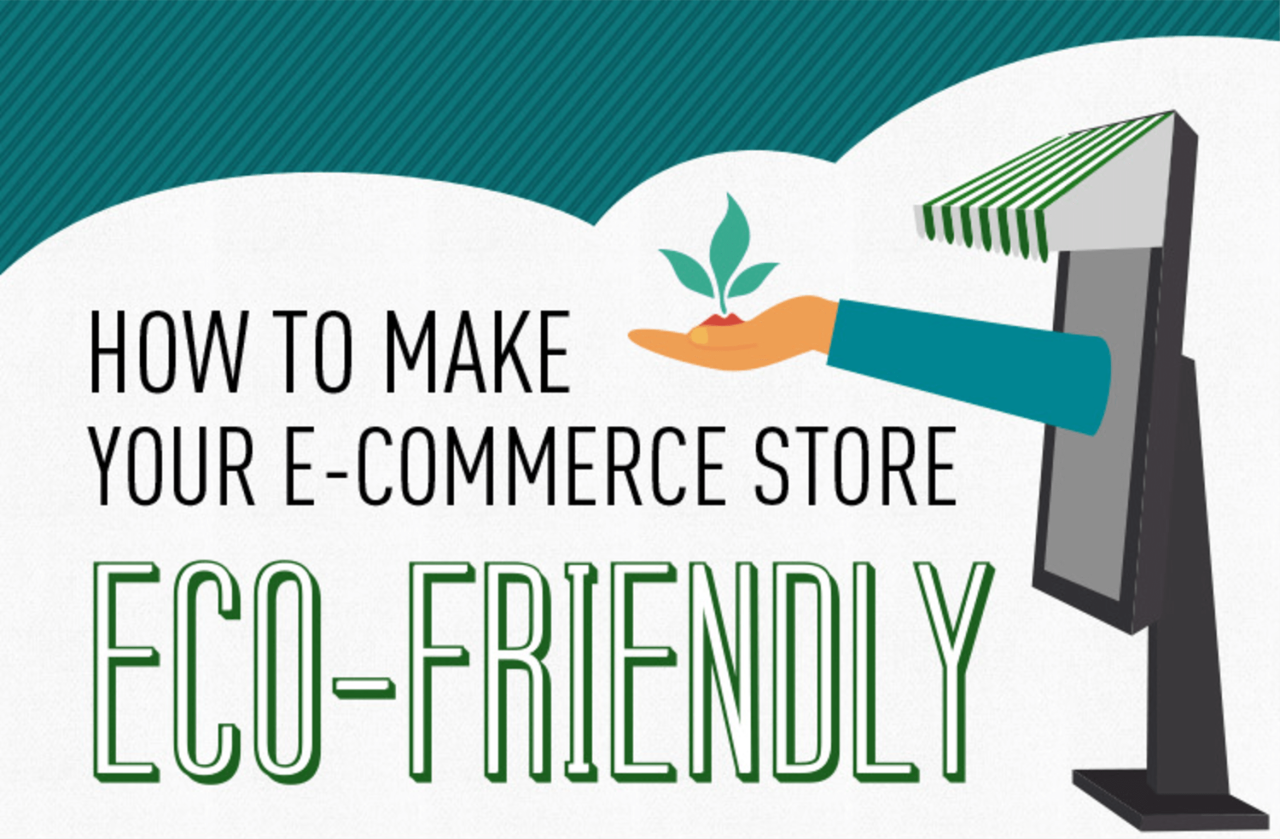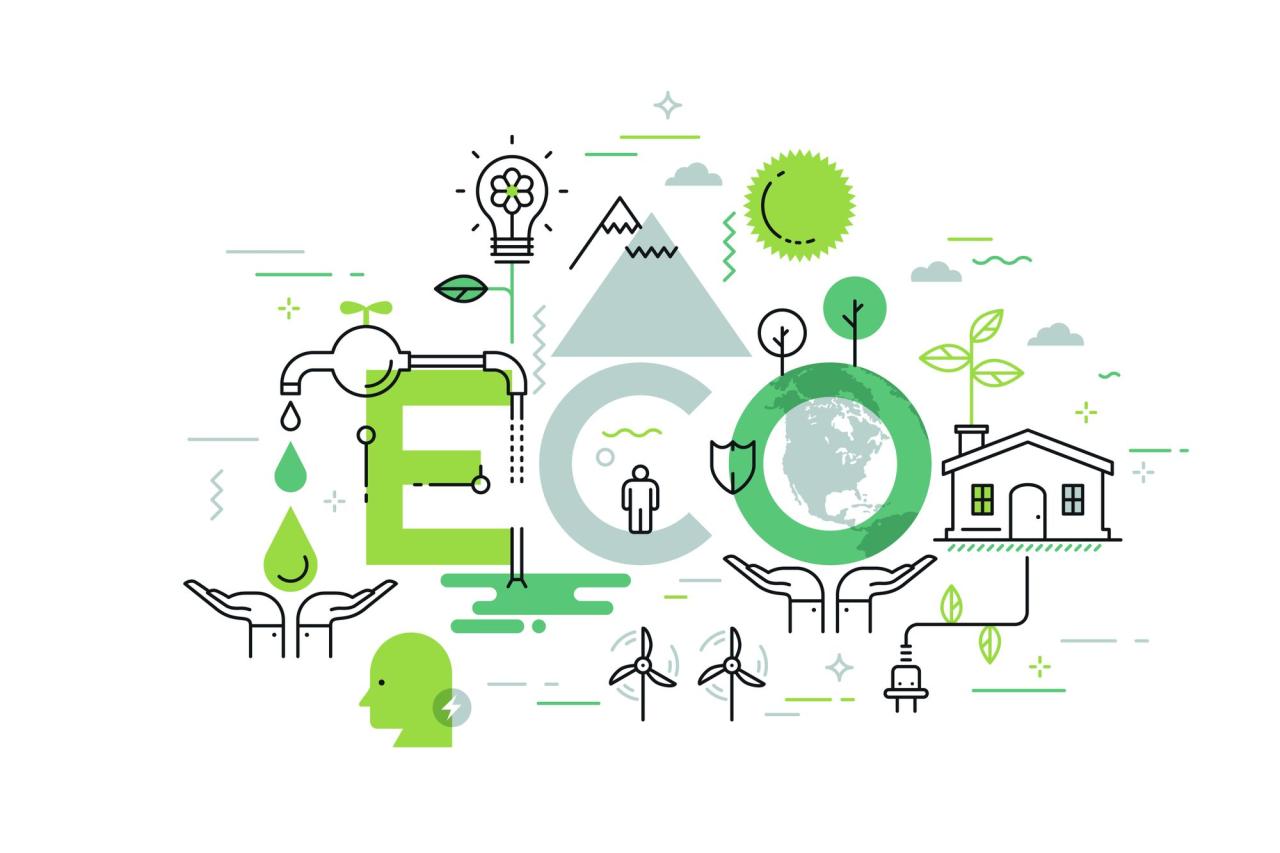Green Ecommerce: Eco-Friendly Business Practices Online sets the stage for a discussion on sustainable business practices in the digital realm. Delving into the world of eco-conscious online operations, this title promises to unveil the innovative strategies and benefits of going green in the ecommerce sphere.
Exploring the various aspects of environmentally friendly business practices online, this article aims to shed light on the importance of sustainability in the ever-evolving landscape of e-commerce.
Importance of Green Ecommerce
Green ecommerce refers to conducting online business operations in an environmentally friendly and sustainable manner. This approach focuses on reducing the carbon footprint, minimizing waste, and promoting eco-conscious practices throughout the entire ecommerce process.
Benefits of Eco-Friendly Business Practices Online
- Reduced Environmental Impact: By adopting green practices, ecommerce businesses can lower their energy consumption, reduce greenhouse gas emissions, and minimize waste generation.
- Cost Savings: Implementing eco-friendly strategies can lead to cost savings in the long run through reduced energy usage, waste management, and resource consumption.
- Enhanced Brand Reputation: Consumers are increasingly valuing sustainability and environmental responsibility. By being a green ecommerce business, companies can attract environmentally conscious consumers and build a positive brand image.
- Compliance with Regulations: Many countries have strict environmental regulations in place. By adopting eco-friendly practices, ecommerce businesses can ensure compliance with these regulations and avoid potential fines or penalties.
Examples of Successful Green Ecommerce Businesses
- Patagonia:Patagonia is a well-known outdoor clothing and gear retailer that has been committed to sustainability for decades. They use recycled materials, promote fair labor practices, and actively support environmental causes.
- Etsy:Etsy is an online marketplace that showcases handmade and vintage products. They have a strong focus on sustainability and support small businesses that prioritize eco-friendly practices.
- Thrive Market:Thrive Market is an online retailer that offers organic and natural products at affordable prices. They are dedicated to promoting healthy living and sustainable sourcing practices.
Implementing Eco-Friendly Packaging
Implementing eco-friendly packaging in ecommerce is crucial for reducing the environmental impact of online businesses. By using sustainable packaging materials, companies can minimize waste, lower their carbon footprint, and appeal to environmentally conscious consumers.
Significance of Eco-Friendly Packaging
- Biodegradable Packaging: Utilizing materials like compostable plastics, paper, or cardboard that can break down naturally and reduce landfill waste.
- Recyclable Packaging: Opting for materials that can be easily recycled, such as paper, cardboard, or certain types of plastics.
- Reusable Packaging: Implementing solutions like reusable boxes, bags, or containers that customers can return for multiple uses.
Comparison of Eco-Friendly Packaging Options
There are various eco-friendly packaging options available for online businesses to choose from. Here are some comparisons:
| Material | Benefits |
|---|---|
| Biodegradable Plastics | Break down naturally, reducing landfill waste. |
| Recycled Paper | Can be easily recycled and is made from sustainable sources. |
| Reusable Containers | Allows for multiple uses, reducing the need for single-use packaging. |
Tips to Reduce Packaging Waste
- Optimize Packaging Design: Use the right size boxes and materials to minimize excess packaging.
- Choose Sustainable Materials: Select eco-friendly packaging options that align with your brand values.
- Implement Recycling Programs: Encourage customers to recycle or return packaging for reuse.
- Reduce Air Fillers: Avoid using excessive air fillers or padding that are not biodegradable.
Sustainable Shipping Practices
Shipping plays a significant role in the environmental impact of ecommerce. The transportation of goods contributes to carbon emissions, which can harm the planet. Implementing sustainable shipping practices is crucial for reducing the carbon footprint of online businesses.
Optimizing Shipping Routes
- Utilize data analytics to optimize shipping routes and reduce unnecessary mileage. By planning efficient routes, businesses can lower fuel consumption and emissions.
- Collaborate with logistics partners to consolidate shipments and minimize the number of vehicles on the road. This strategy can help decrease carbon emissions associated with transportation.
- Invest in eco-friendly vehicles, such as electric or hybrid trucks, to further reduce the environmental impact of shipping operations.
Carbon Offsetting in Ecommerce Logistics
- Carbon offsetting involves investing in projects that reduce or offset greenhouse gas emissions to compensate for carbon footprint. Online businesses can participate in carbon offset programs to neutralize the environmental impact of their shipping activities.
- Support renewable energy projects, reforestation initiatives, or sustainable agriculture practices through carbon offsetting to counterbalance the emissions generated during shipping processes.
- Communicate transparently with customers about the company's carbon offsetting efforts to raise awareness and promote eco-friendly practices in ecommerce logistics.
Energy-Efficient Operations

Reducing energy consumption in online businesses is crucial for minimizing environmental impact and cutting costs. By implementing energy-efficient practices, companies can not only reduce their carbon footprint but also improve their overall sustainability efforts.
Benefits of Using Renewable Energy Sources
- Lower carbon emissions: Renewable energy sources such as solar or wind power produce minimal to no greenhouse gas emissions, helping to combat climate change.
- Cost savings: While initial setup costs may be higher, using renewable energy sources in the long run can lead to significant savings on electricity bills.
- Enhanced brand image: Consumers are increasingly favoring eco-friendly businesses, and utilizing renewable energy can help companies attract environmentally conscious customers.
Companies Implementing Energy-Efficient Practices
- Amazon: The e-commerce giant has committed to powering its operations with 100% renewable energy by 2025 and has already made significant progress in installing solar panels on its warehouses.
- Etsy: The online marketplace offsets 100% of its electricity consumption with renewable energy and has implemented energy-efficient practices in its data centers and offices.
- Patagonia: The outdoor apparel company has invested in renewable energy projects and energy-efficient technologies to reduce its carbon footprint and promote sustainability.
Green Website Design

Creating a sustainable web design for eco-friendly ecommerce is crucial in minimizing the environmental impact of online businesses. By implementing green practices in website development, businesses can contribute to a healthier planet and attract environmentally conscious consumers.
When designing an environmentally friendly website, consider the following tips:
Tips for Creating an Environmentally Friendly Website
- Optimize images and videos to reduce file sizes and improve loading times, which can lower energy consumption.
- Use clean and minimalist designs to reduce clutter and create a more user-friendly experience.
- Implement responsive design to ensure your website is accessible and user-friendly across different devices.
- Choose a sustainable web hosting provider that uses renewable energy sources to power servers.
- Utilize efficient coding practices to reduce the overall carbon footprint of your website.
By incorporating these sustainable design practices, websites can play a significant role in promoting eco-friendly ecommerce and overall sustainability.
Conclusion
In conclusion, Green Ecommerce: Eco-Friendly Business Practices Online encapsulates the essence of eco-conscious entrepreneurship in the digital age. By embracing green initiatives, businesses can not only reduce their environmental footprint but also pave the way for a more sustainable future in online commerce.
Top FAQs
What are the benefits of green ecommerce?
Green ecommerce helps businesses reduce their carbon footprint, attract environmentally conscious consumers, and contribute to a more sustainable future.
How can online businesses reduce packaging waste?
Online businesses can reduce packaging waste by using biodegradable materials, minimizing excess packaging, and implementing efficient packaging designs.
What is carbon offsetting in ecommerce logistics?
Carbon offsetting in ecommerce logistics involves compensating for carbon emissions generated during shipping by investing in projects that reduce greenhouse gases.












